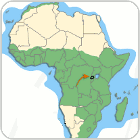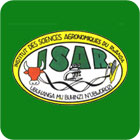Plant breeding programs in Rwanda
 Although agriculture in Rwanda is mainly for subsistence, it is the most important sector in Rwanda’s economy, contributing about 43% to the GDP and employing more than 90% of the active population in 1998. Rwanda’s main food crops are banana, sweet and Irish potatoes, cassava, pulses, sorghum and maize. Coffee and tea are the major export crops, accounting for more than 60% of the value of all Rwanda’s exports.
Although agriculture in Rwanda is mainly for subsistence, it is the most important sector in Rwanda’s economy, contributing about 43% to the GDP and employing more than 90% of the active population in 1998. Rwanda’s main food crops are banana, sweet and Irish potatoes, cassava, pulses, sorghum and maize. Coffee and tea are the major export crops, accounting for more than 60% of the value of all Rwanda’s exports.
The first agricultural research activities in Rwanda trace back to 1930 during colonization by Belgium. After a famine in 1929, a seed multiplication center was established in the country, which became the current Rwanda’s Agricultural Research Institute (ISAR), the only agricultural research institute by mandate in Rwanda. The other institutes contribute only modestly to agricultural research. The 1994 genocide had catastrophic consequences. The national institute was looted, losing most human resources, equipment, publications and germplasm collection.
Agricultural research is expected to play a key role in reversing the steadily declining crop production, by developing and disseminating resistant varieties through biotechnology. Most of the breeding activities consisted in evaluation of introduced germplasm from abroad. The crops receiving the most research attention are beans, sweet potatoes and bananas. Biotechnology is a new venture in Rwanda and is still limited to tissue culture. In general, budget allocation to plant breeding has been minimal, especially after 1994.
The Rwandese 1994 genocide wiped out all efforts in plant breeding; immediately after 1994 there was no single practicing plant breeder in the country, and no infrastructure. Plant breeding and biotechnology cannot be developed as long as there is not a minimum nucleus of professional breeders, and a significant effort of the Government to resuscitate agricultural research.
Research and education institutes with activities in plant breeding
 |
Rwanda Agricultural Research Institute - Institut des Sciences Agronomiques du Rwanda (ISAR)
|
______________________________________
Information by Patrick Karangwa (2007) - Information based on the Rwanda's full report from the PBBC survey. Last revised 30-03-2010, GIPB.
